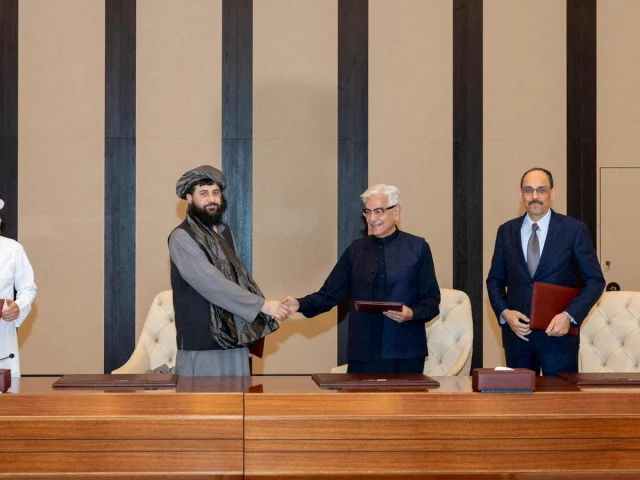Both sides agree to maintain the ceasefire on the condition that Afghan soil is not used for attacks against Pakistan.
Defense Minister Khawaja Muhammad Asif and Afghan Defense Minister Mullah Mohammad Yaqoob Mujahid shake hands after signing a ceasefire agreement brokered by Qatar and Turkey in Doha on October 19. Photo: Reuters
Pakistan and the Afghan Taliban reached a tentative agreement after six days of high-level talks in Istanbul, aimed at preventing the use of Afghan soil for terrorist activities against Pakistan and taking decisive action against the Indian-backed militant groups Tehreek-e-Taliban Pakistan (TTP) and the Balochistan Liberation Army (BLA), called by Pakistani officials “Fitna al-Khawarij” and “Fitna al-Hindustan “.
The dialogue appeared to stall several times over the past week, with the Pakistani delegation even preparing to return home without any progress. However, following requests from the host countries – Turkey and Qatar – and a call from the Afghan Taliban delegation, Pakistan agreed to continue negotiations “to give peace another chance”.
During Thursday’s session, the two sides reached a tentative mutual agreement, the key points of which are as follows:
-
All parties reaffirmed that the aim of the talks was to strengthen the ceasefire initially agreed in Doha.
-
Both sides pledged to maintain the ceasefire on the condition that Afghan territory is not used for terrorist attacks against Pakistan. The agreement also requires the Afghan Taliban to take “clear, verifiable and effective measures” against groups such as Fitna al Khwarij (TTP) and Fitna al Hindustan (BLA).
-
The next round of negotiations will take place in Istanbul on November 6 to finalize details and implementation mechanisms.
-
A joint monitoring and verification mechanism will be put in place to ensure compliance with the agreement and impose sanctions on any party that violates the agreement.
-
Turkey and Qatar, acting as mediators and hosts, congratulated both sides for their participation and reaffirmed their commitment to supporting lasting peace and stability in the region.
During the talks, the Pakistani delegation maintained a strong, evidence-based stance, presenting its demands with “clarity, professionalism and logical consistency.” The final agreement was described as a “victory of reason and the national interest.”
The interim outcome of the talks constitutes a positive step towards regional stability and a landmark achievement despite attempts by adversaries to derail the process through propaganda and pressure.
Pakistan’s participation in the Istanbul talks, marked by “seriousness, prudence and national dignity”, was widely appreciated. Mediation efforts by Turkey and Qatar were also credited with contributing to the breakthrough.
The government reiterated that Pakistan remains committed to seeking peace but will not compromise on its sovereignty, national interests or public security. Civil and military leaders reaffirmed their unity and determination to counter all internal and external threats to the stability of the country.
Doha talks
The Istanbul dialogues follow Pakistan and Afghanistan agreeing to an immediate ceasefire at the Doha talks, after a week of intense border clashes – the worst since the Taliban took power in Kabul in 2021.
Pakistani delegation, led by Khawaja Asif, including other senior officials. On the Afghan side, the negotiations were led by Acting Defense Minister Mullah Yaqoob, accompanied by other representatives.
Pakistani officials have raised the issue of cross-border terrorist attacks originating from Afghanistan, particularly singling out groups such as the Gul Bahadur faction and the TTP. Islamabad says these groups have been involved in multiple deadly incidents in Pakistan in recent months.
Sources close to the negotiations said Pakistan was presenting a “single-point agenda” focused on dismantling terrorist networks. “Pakistan has made it clear that the Afghan government must eliminate terrorist organizations and their hideouts,” sources said.
Taliban spokesman Zabihullah Mujahid said in a statement that the parties had agreed to a comprehensive and meaningful ceasefire.
Tensions escalate after unprovoked shooting by Afghan Taliban regime
Tensions along the Pak-Afghan border escalated on October 12, when clashes erupted after the Afghan Taliban regime opened unprovoked fire on several locations in Khyber-Pakhtunkhwa (KP) and Balochistan, provoking a swift and forceful response from the Pakistani army, which destroyed several Afghan posts and killed dozens of Afghan soldiers and militants.
The coordinated assault began in several key areas including Angoor Adda, Bajaur, Kurram, Dir, Chitral in Khyber-Pakhtunkhwa and Baramcha in Balochistan. According to security sources, the firing was aimed at facilitating the illegal entry of Khwarij – the state’s term for the banned TTP – into Pakistani territory.
“The Pakistani army reacted immediately and decisively,” security sources said. “The counter-offensive effectively targeted and destroyed several Afghan posts on the border. Dozens of Afghan and Khwarij soldiers were killed in retaliatory fire.”




